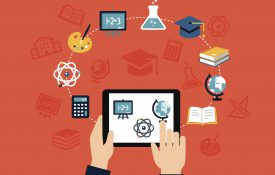-
The worst question you could ask women in a job interview
The Washington Post: During a recent talk in Washington, Google's “people operations” chief Laszlo Bock said something notable about fixing the equal pay conundrum. While he admitted that men tend to negotiate more than women, what he didn't do was suggest — as is so often the case — that solving the gender wage gap is simply a matter of women negotiating more. Rather, he said, “large companies could totally fix this problem.” ...
-

Science of Learning Can Help Parents, Developers Grade Educational Apps
A comprehensive research report provides an evidence-based guide that parents, educators, and app designers alike can use to evaluate the quality of so-called “educational” apps. Visit Page
-
OPRE Grant Announcement: Family Strengthening Scholars
The Office of Planning, Research and Evaluation (OPRE) in the Administration for Children and Families, US Department of Health and Human Services has recently published a discretionary research funding announcement. The full announcement for “Family Strengthening Scholars” is available online at: http://www.acf.hhs.gov/grants/open/foa/view/HHS-2015-ACF-OPRE-PD-0977. OPRE intends to award up to three grants to support dissertation research on healthy marriage/responsible fatherhood policy issues (HMRF).
-
Students’ Family Income Linked With Brain Anatomy, Academic Achievement
Many years of research have shown that for students from lower-income families, standardized test scores and other measures of academic success tend to lag behind those of wealthier students. A new study led by researchers at MIT and Harvard University offers another dimension to this so-called “achievement gap”: After imaging the brains of high- and low-income students, they found that the higher-income students had thicker brain cortex in areas associated with visual perception and knowledge accumulation. Furthermore, these differences also correlated with one measure of academic achievement — performance on standardized tests.
-
Researchers Found the ‘Bystander Effect’ in 5-Year-Olds
New York Magazine: The 1964 stabbing death of Kitty Genovese in New York City went a long way toward kicking off social psychologists’ interest in the subject: In the story’s initial reporting and subsequent retellings, numerous bystanders heard Genovese’s cries for help but failed to intervene. (This, as The New Yorker pointed out last year, isn’t quite how things actually went down, but the effect has been observed in many other contexts as well.) ... But as a team led by Maria Plötner of the Max Planck Institute for Evolutionary Anthropology writes in a new article in Psychological Science, we don’t know much about how and when the bystander effect emerges in children.
-
Why People Care More About Pets Than Other Humans
Wired: WE LOVE OUR pets. Two thirds of Americans live with an animal, and according to a 2011 Harris poll, 90 percent of pet owners think of their dogs and cats as members of the family. These relationships have benefits. For example, in a survey by the American Animal Hospital Association, 40 percent of married female dog owners reported they received more emotional support from their pet than from their husband or their kids. The pet products industry calls this “the humanization of pets.” One of my colleagues recently spent $12,000 on cancer treatments for her best friend Asha, a Labrador retriever.

